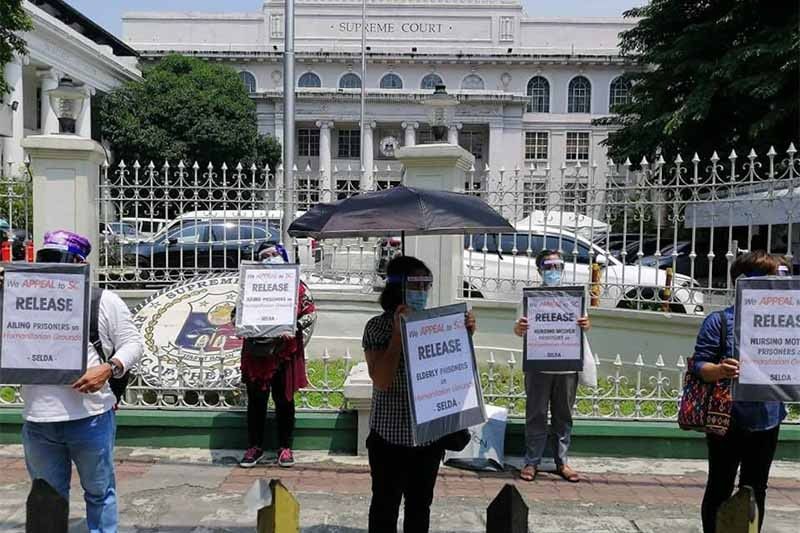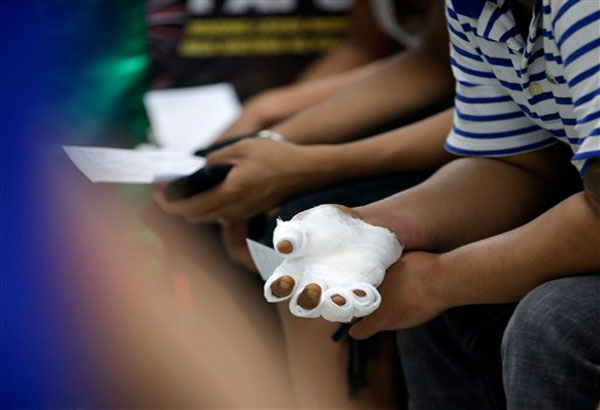Kin mark fifth month of plea to free detainees by protesting Pemberton pardon

MANILA, Philippines — Five months since they filed their petition, families of political prisoners returned to the Supreme Court on Tuesday and urged it to order the release of their loved ones on humanitarian grounds amid the COVID-19 pandemic.
KAPATID, a support group of political prisoners and their families, and the petitioners have been going to SC almost every Tuesday—in time for the en banc session— to call on the justices to act on their pending petition for release of vulnerable and sickly detainees.
On September 8, exactly five months since they first ran to the courts, the petitioners returned to the SC with black candles, as they also condemned the impending release of US Marine L/Cpl. Joseph Scott Pemberton following President Rodrigo Duterte's taking notice of his case and eventually granting him a pardon.
“Where is justice when a US soldier convicted of homicide over the killing of Jennifer Laude was granted absolute pardon while hundreds of incarcerated Filipinos languish in prisons because of fabricated and baseless charges meant to silence them from speaking against government injustices,” said Fides Lim, KAPATID spokesperson.
Duterte said he decided to grant Pemberton a pardon in the spirit of “fairness.” He noted that issues on the time allowances he earned and records of such during the period of preventive imprisonment are pending, but said the government was partly at fault on the issues.
“It’s my decision to pardon. Correct me if I’m wrong, but ito yung tingin ko sa kaso. You have not treated Pemberton fairly so i-release ko,” he said.
READ: Duterte on Pemberton pardon: Allow him the good character presumption
A pardon cannot be reviewed by court except in three instances—impeachment, pending appeal, and election offenses. Criminal law professor Theodore Te said the act of granting a pardon is a "political question."
No prompt, no application for pardon
Guevarra said “no one” prompted Duterte to grant the pardon—state prosecutors were in fact moving to oppose Pemberton’s release via GCTA.
Pemberton’s lawyer, Rowena Flores, admitted that she does not know how the president arrived at the decision. She did not personally file a petition for pardon for the US marine — the usual process for pardon grants.
READ: Duterte pardon grant to Pemberton 'solely his own' — Guevarra
Undersecretary Markk Perete, Department of Justice spokesperson, acknowledged that Pemberton did not go through the “normal process” of applying for pardon. This would entail going through the Board of Pardons and Paroles and at least 14 documentary requirements, including a comment from the offended party.
But the president has the power to grant pardons and that, Duterte said Monday night, cannot be questioned. “It was the president himself who decided to grant pardon based on his appreciation of the facts on the ground,” Perete said in an interview with Dobol B sa News TV.
Robredo: How about other prisoners?
Vice President Leni Robredo on Tuesday questioned whether Duterte’s decision is fair and just, in the face of thousands of Filipinos who detained with pending cases.
“Pemberton had lawyers, special detention facilities, a quick, public trial, and an appeal. Now, it appears he also has resources to ensure that the president himself can take notice of his case,” Robredo said.
“So many Filipinos with lesser offenses, but they are not given notice or granted such kind of privilege. What we are seeing: When it’s the poor, there is punishment; when it is the rich and the privileged, there is freedom,” she added in Filipino.
READ: Pemberton pardon shows Filipinos' welfare secondary to foreigners', groups say
With Duterte’s decision, the legal issues hounding Pemberton’s case have been swept under the rug. These include whether the US serviceman imprisoned under the guidelines of the Visiting Forces Agreement is entitled to GCTA or whether authorities not from BuCor or Bureau of Jail Management and Penology or the jail warden may sign GCTA records.
The implementation of the GCTA law was also questioned in 2019 when double murder and rape convict Antonio Sanchez was supposedly set for release.
Due to the controversy it stirred, the government saod it would temporarily put its implementation on hold. It also threatened heinous crimes convicts freed through GCTA to return to prison or be treated as fugitives.
The DOJ also revised the Implementing Rules and Regulations of the law.
A year since the controversy, the DOJ said GCTA applications are continuing but some are still put on hold, these are cases of those charged with heinous crimes but convicted on a non-heinous offense.
READ: After suspension and call for transparency, government quietly resumes GCTA
DOJ Undersecretary Deo Marco said he asked BuCor for updated data on Monday, but BuCor spokesperson Gabriel Chaclag merely said that “many” have been freed under GCTA although data on these releases has yet to be released.
- Latest
- Trending




























